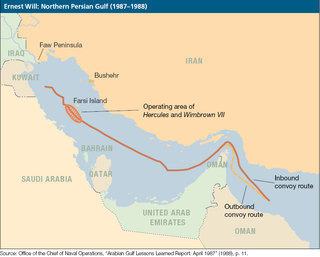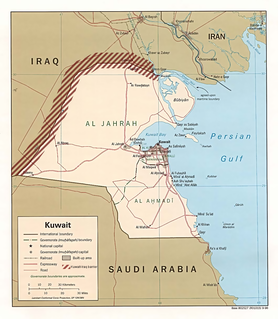 W
WUnited Nations Security Council resolution 552, adopted on 1 June 1984, after hearing complaints from Bahrain, Kuwait, Oman, Qatar, Saudi Arabia and the United Arab Emirates regarding attacks on their ships by Iran, the Council condemned the attacks, reiterating that Member States should refrain from using threats or use of force in their international relations.
 W
WUnited Nations Security Council resolution 660, adopted on 2 August 1990, after noting its alarm of the invasion of Kuwait by Iraq, the Council condemned the invasion and demanded Iraq withdraw immediately and unconditionally to positions as they were on 1 August 1990.
 W
WIn United Nations Security Council resolution 661, adopted on 6 August 1990, reaffirming Resolution 660 (1990) and noting Iraq's refusal to comply with it and Kuwait's right of self-defence, the Council took steps to implement international sanctions on Iraq under Chapter VII of the United Nations Charter. This was the second resolution by the Security Council over the invasion of Kuwait.
 W
WUnited Nations Security Council resolution 662, adopted unanimously on 9 August 1990, recalling resolutions 660 (1990) and 661 (1990), the Council decided that the annexation of Kuwait by Iraq under any form was illegal.
 W
WUnited Nations Security Council resolution 664, adopted unanimously on 18 August 1990, reaffirming resolutions 660 (1990), 661 (1990) and 662 (1990), the Council recalled Iraq's obligations under international law and acting under Chapter VII of the United Nations Charter, demanded that Iraq permit and facilitate the departure of nationals from third countries from within Iraq and Kuwait, calling for consular and diplomatic access to the third state nationals.
 W
WIn United Nations Security Council Resolution 666, adopted on September 13, 1990, after recalling resolutions 661 (1990) and 664 (1990) which discussed the humanitarian situation in Iraq and Kuwait and the detention of nationals from foreign countries, the Council decided to ask the 661 Committee to determine if humanitarian needs have arisen and to keep the situation under review. At the same time, it expected Iraq to comply with its obligations under international law, including the Fourth Geneva Convention, relating to the safety and detainment of third-state nationals in Iraq and occupied Kuwait.
 W
WUnited Nations Security Council resolution 667, adopted unanimously on 16 September 1990, after recalling resolutions 660 (1990), 661 (1990), 664 (1990), 665 (1990) and 666 (1990), the Council expressed its outrage and condemned "aggressive acts" by Iraq against diplomatic missions and personnel in occupied Kuwait, including the abduction of some, in violation of the Vienna Convention on Diplomatic Relations and Consular Relations.
 W
WUnited Nations Security Council resolution 674, adopted on 29 October 1990, after recalling resolutions 660 (1990), 661 (1990), 662 (1990), 664 (1990), 665 (1990), 666 (1990), 667 (1990) and 670 (1990) on the topic of Iraq, the Council condemned the continuing situation in occupied Kuwait after the Iraqi invasion on 2 August 1990, reaffirming the goal of the international community of maintaining international peace and security.
 W
WUnited Nations Security Council resolution 677, adopted unanimously on 28 November 1990, after recalling resolutions 660 (1990), 662 (1990) and 674 (1990), the Council condemned attempts by Iraq to alter the demographic information of Kuwait and the restrictions on the movement of its citizens.
 W
WUnited Nations Security Council Resolution 678, adopted on 29 November 1990, after reaffirming resolutions 660, 661, 662, 664, 665, 666, 667, 669, 670, 674 and 677, the Council noted that despite all the United Nations efforts, Iraq continued to defy the Security Council.
 W
WUnited Nations Security Council resolution 686, adopted on 2 March 1991, after reaffirming resolutions 660, 661, 662, 664, 665, 666, 667, 669, 670, 674, 677 and 678, the Council noted the suspension of military activities against Iraq and that all twelve resolutions continue to have full force and effect.
 W
WUnited Nations Security Council resolution 689, adopted unanimously on 9 April 1991, after recalling Resolution 687 (1991), the Council noted a report by the Secretary-General and decided to establish the United Nations Iraq–Kuwait Observation Mission to monitor the demilitarized zone between Iraq and Kuwait, known as the Kuwait–Iraq barrier.
 W
WUnited Nations Security Council resolution 692, adopted on 20 May 1991, after recalling resolutions 674 (1990), 686 (1991) and 687 (1991), as well as taking the report by the Secretary-General, the Council decided to establish the United Nations Compensation Commission to deal with compensation claims resulting from Iraq's invasion of Kuwait, which subsequently led to the Gulf War.
 W
WUnited Nations Security Council resolution 773, adopted on 26 August 1992, after recalling resolutions 687 (1991) and 689 (1991), the Council considered the work of the Iraq–Kuwait Boundary Demarcation Commission established on 2 May 1991, and reiterated its position that it would enforce any violation of the ceasefire in the demilitarised zone.
 W
WUnited Nations Security Council resolution 806, adopted unanimously on 5 February 1993, after recalling resolutions 687 (1991), 689 (1991) and 773 (1992) in addition to a report by the Secretary-General Boutros Boutros-Ghali, the Council, acting under Chapter VII of the United Nations Charter, guaranteed the inviolability of the international boundary between Iraq and Kuwait measures taken to enforce it, in the aftermath of Iraqi incursions into the demilitarised zone in January 1993.
 W
WUnited Nations Security Council resolution 833, adopted unanimously on 27 May 1993, after recalling resolutions 687 (1991), 689 (1991), 773 (1992) and 806 (1993) in addition to a report by the Secretary-General Boutros Boutros-Ghali, the Council noted the continuing work of the United Nations Iraq-Kuwait Boundary Demarcation Commission.
 W
WUnited Nations Security Council resolution 949, adopted unanimously on 15 October 1994, after recalling previous resolutions including 678 (1990), 686 (1991), 687 (1991), 689 (1991) and 833 (1993) on Iraq, the Council, acting under Chapter VII of the United Nations Charter, demanded that Iraq withdraw troops recently deployed to the border with Kuwait or face further measures.
 W
WUnited Nations Security Council Resolution 2701 is a United Nations Security Council resolution adopted unanimously on 27 June 2013. It removes Iraq from its obligations concerning the return of Kuwaiti and third-state nationals or their remains to their proper state that were seized under the former Saddam regime. Following the passage of the resolution, Hoshyar Zebari, Iraq's foreign minister, said that it marked a turning point in Iraq's relationship with the international community, and a significant step in the process of mending bilateral ties.